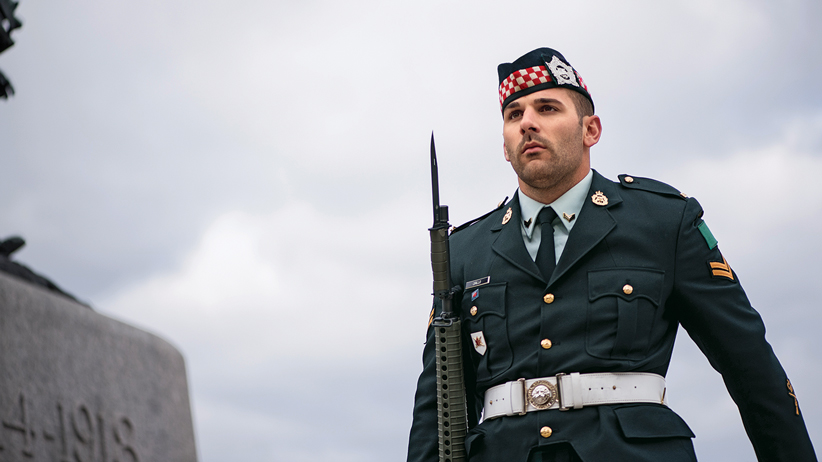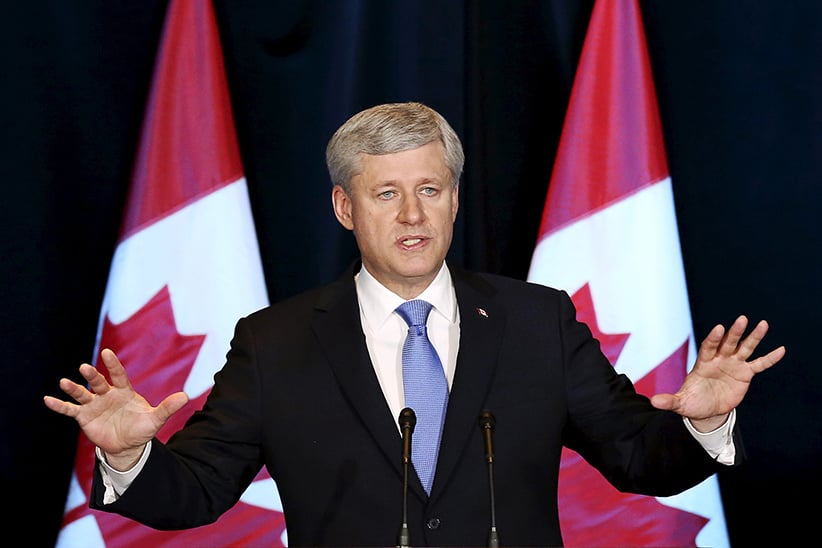Letters: ‘He never even tried’
Maclean’s readers write in
Canada’s Prime Minister Stephen Harper speaks during a news conference on the Trans-Pacific Partnership (TPP) trade agreement in Ottawa, Canada October 5, 2015. (Chris Wattie/Reuters)
Share

The kindness of strangers
The entire Cpl. Nathan Cirillo tragedy touched me greatly. It was unbelievable. Heartbreaking. It resonated with me, how all those strangers dropped everything and ran to the fallen soldier’s side. I, as many others, was moved to tears. It was so reassuring to know he wasn’t alone in his last moments. When I read of the woman who stayed by his head, speaking to him lovingly and comfortingly, in a way that made others there think she was a relative or acquaintance, I cried. Today, I gasped when I saw the cover of your magazine (“After October 22,” National, Oct. 19). Thank you very much for reminding us how more of us should act when someone needs us most.
Catherine Katsaros, Montreal
You’re not that Canadian
Stephen Harper would have us believe that Bill C-24 only applies to terrorists who have acquired Canadian citizenship and who have committed crimes against Canada (“Who gets to be Canadian?” National, Oct. 19). In fact, it also applies to Canadian-born citizens who may be able to claim citizenship elsewhere even if they haven’t (i.e., someone whose parents were born elsewhere but the person involved has never applied for citizenship there). It also applies to people convicted of a terrorist offence in another country who received a sentence of five years or greater, even if that country’s justice system is questionable. Mohamed Fahmy’s original sentence in Egypt would have put him in that category. The decision to revoke citizenship is made by a government employee and is not subject to appeal, which is manifestly unfair and subject to abuse.
Graham Taylor, Richmond, B.C.

Not-so-free trade
Stating that Harper’s commitment to trade “stands as his signature accomplishment” (The Editorial, Oct. 19)—and citing the European pact (CETA) and the Trans-Pacific Partnership (TPP)—is not true and will not be true, until CETA is signed in 2016 and the TPP is signed after the U.S. election in November 2016. Right now, it is still 2015. All our Prime Minister has ratified since 2006 are a few small trade pacts with South Korea, Jordan, Colombia, Honduras, Peru and Panama. Had Harper finally achieved free trade within Canada, among the provinces and territories, he really would have his place in our history books. He never even tried.
Dorothy Madge, Windsor, Ont.
Packing on the protein
Every cell in our body depends on protein (“The protein plague,” Taste, Oct. 12). Demonizing an essential nutrient can only lead to trouble. Canadians should enjoy the benefits of protein-rich foods as part of a balanced diet. In addition to providing high-quality protein, meat, poultry, milk and eggs are important sources of nutrients, such as B-vitamins, vitamin D, calcium, iron and zinc, which support children’s growth and development, and promote healthy aging.
Valerie Johnson, M.HSc., R.D., Toronto
The male gaze
In an article titled “Why men can’t have it all” (Society, Oct. 5), you quote Stephen Marche as saying: “There is no academic sociology on masculinity, which is bizarre.” What? Gender has preoccupied sociological thinking for much longer than 50 years. I am always suspicious when a white, privileged man claims that “masculinity is marginal.” Not only does it sidestep the long history of having issues important to women eclipsed by, or evaluated against, issues important to men, it also fails to acknowledge how certain groups of men—working-class, immigrant, disabled, homosexual—are marginalized in relation to more powerful groups of men. Maclean’s should select “experts” who are actually situated within the field.
Caitlin Forsey, Winnipeg
Daycare not detrimental
Your Oct. 12 editorial, highlighting new research claiming that Quebec’s universal daycare “causes” developmental and social ills, is incorrect in its description of the research involved, which claimed that children enrolled in Quebec’s system had poor child-development results and that the study “tracks the effects of Quebec’s program on children who have since graduated.” Neither is true, as the researchers included all children in Quebec at two points in time, not just those in “universal daycare.” In a study about child-development outcomes, drawing conclusions without knowing who has been “exposed” to “the treatment,” who got which version of “the treatment,” or whether “the treatment” quality was uniform, is not acceptable. Better to wait until this is all submitted to a child-development journal. After all, child-care policy isn’t airborne, like the flu.
Martha Friendly, Executive Director, Childcare Resource and Research Unit, Toronto